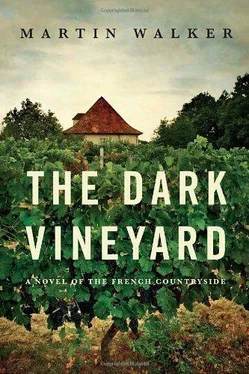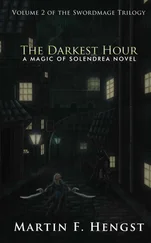Martin Walker - The dark vineyard
Здесь есть возможность читать онлайн «Martin Walker - The dark vineyard» весь текст электронной книги совершенно бесплатно (целиком полную версию без сокращений). В некоторых случаях можно слушать аудио, скачать через торрент в формате fb2 и присутствует краткое содержание. Жанр: Полицейский детектив, на английском языке. Описание произведения, (предисловие) а так же отзывы посетителей доступны на портале библиотеки ЛибКат.
- Название:The dark vineyard
- Автор:
- Жанр:
- Год:неизвестен
- ISBN:нет данных
- Рейтинг книги:5 / 5. Голосов: 1
-
Избранное:Добавить в избранное
- Отзывы:
-
Ваша оценка:
- 100
- 1
- 2
- 3
- 4
- 5
The dark vineyard: краткое содержание, описание и аннотация
Предлагаем к чтению аннотацию, описание, краткое содержание или предисловие (зависит от того, что написал сам автор книги «The dark vineyard»). Если вы не нашли необходимую информацию о книге — напишите в комментариях, мы постараемся отыскать её.
The dark vineyard — читать онлайн бесплатно полную книгу (весь текст) целиком
Ниже представлен текст книги, разбитый по страницам. Система сохранения места последней прочитанной страницы, позволяет с удобством читать онлайн бесплатно книгу «The dark vineyard», без необходимости каждый раз заново искать на чём Вы остановились. Поставьте закладку, и сможете в любой момент перейти на страницу, на которой закончили чтение.
Интервал:
Закладка:
“Yes, I saw that.” In the strengthening light of dawn, Bruno watched a smile twitch at the mayor’s lips. “Well, it seems clear there’s been a crime here.”
“Right, and that means the Police Nationale, not the gendarmes. They might even want to send a forensics team.”
Bruno walked on to the row of parked cars and the small knot of locals to tell them there was no danger, that the show was over, and to ask them to move their cars so the fire trucks could turn around and leave. Big Stephane the dairy farmer, a friend of Bruno’s from the hunting club, was there with his pretty young daughter Dominique. Their farm was just down the hill, probably one of the first that would have been hit if the fire had spread, and this was normally the hour when they would start the milking. Bruno shrugged off their questions and persuaded most of the onlookers back into their cars. Then he walked over to Captain Duroc to arrange for a gendarme to seal off the phone booth in Coux. It was just past 6 a.m. Fauquet’s cafe would be open, and Bruno needed a proper breakfast.
Bruno walked toward two familiar cars, an elderly Citroen DS from the 1960s and an even older Citroen deux chevaux, a design with a canvas hood that traced back to the 1930s. His friend the baron, a retired industrialist whose trim figure belied his age, leaned against his big car. Beside him stood Pamela, the owner of the deux chevaux and of a local guesthouse, who was known to most of Saint-Denis as the Mad Englishwoman. Bruno had introduced them over a game of tennis, and Pamela and a visiting friend had thoroughly trounced them.
“The baron woke me with a phone call. I hadn’t heard the siren,” Pamela said. A handsome woman whose features were too strong to be described simply as pretty, she was wearing an Hermes head scarf and a battered version of the English waxed cotton jacket that had become highly fashionable in France. Whether she was standing, walking or on horseback, Bruno could recognize her at a distance from her posture alone, the straight back and the proud neck, the bold stride of a woman wholly at ease with herself.
“Where’s your horse?” Bruno asked, leaning forward to kiss her on both cheeks. She shrank back, laughing.
“Sorry, Bruno. Normally I love this French obsession with kissing, but you look terrible and smell worse. Of burned wool and I suppose that awful foam all over your trousers. And I think you’ve lost your eyebrows. It’s hard to see under all the black smears over your face.”
“I’m fine,” he said, touching his fingers to his eyebrows. They felt like the bristles on his chin.
“I didn’t bring the horse,” she said, “because I thought the fire might frighten her. I only came up to see if we’d have to evacuate.”
“What’s that building that was on fire?” asked the baron. “I thought I knew every inch of these hills but I never knew it was there.”
“Nor I,” said Bruno. “There’s a break in the trees, and then a track that curves away toward the field so you can’t see it from the road. I want some breakfast. See you back at Fauquet’s?”
“Good idea,” said the baron. “It’s far too late to go back to sleep. Pamela, please be our guest, so long as you promise to prefer our company to your English crossword puzzle.”
“But of course, Baron. You’re more entertaining than any crossword puzzle. But I think Bruno needs to wash and change first.” She studied him. “You’d better throw those trousers away. I hope the town pays for a new uniform.”
2
Even in the age of computers, it was not an easy task to find out who owned the charred field and burned-out shed. Claire, the mayor’s secretary, pored over the cadastre, the giant map that listed every building in the far-flung commune of Saint-Denis. It also showed the boundaries of every plot of land, each identified by its own lot number. She wrote down the relevant numbers. Now they could cross-check it against the tax list to learn the identity of the registered owner.
“There’s no building marked on the map anywhere up here,” Claire complained. “Are you sure you’ve got the right road, Bruno?”
“Yes, I’m sure.” Showered, shaved and dressed in a spare uniform, Bruno was feeling himself again, except for the eyebrows. He came over to join her at the giant map, careful to keep some space between himself and Claire’s ample form. Even though irritated, she couldn’t resist flirting with him and batted her eyelashes from sheer habit. The only single man at the mairie, Bruno was used to Claire’s ways.
He traced the road he had taken that morning. “The microwave tower was there and the water tower was over there, so the water line must have run along the road to that point,” he muttered to himself, placing his finger firmly on the spot. He was sure he had the correct lot, but Claire was right. There was no building marked on the map. That was not just very odd, it was also a criminal offense, since it meant the commune had granted no construction permit. And because the land was also served by a water line and a standpipe, the commune was being cheated out of its annual water fee. Still, he had the lot number. He left Claire to roll up the map, and went into the cramped room that was called the registry to check the name of the owner in the tax files.
The owner was a societe anonyme, a company called Agricolae with a registered office in Paris, and the lot had been purchased from the Ministry of Defense three years earlier. Agricolae-that had been the name on the metal flag Bruno had plucked from the ground and put in the pocket of Albert’s pompier jacket. He’d have to get that back. The file showed that no water fee had been paid, no building tax either, and there was no building permit. That meant the company called Agricolae was in trouble. He was just reaching for the phone in his office to call Albert when Claire peeked around the door to tell him he had a visitor.
“The most important man in Saint-Denis after the mayor and they still keep you in this miserable hole they dare to call an office,” declared Commissaire Jean-Jacques Jalipeau, the chief detective of the Police Nationale for the departement. He took a half step into the room and at once seemed to fill it.
“Christ, you look terrible, face all red and eyebrows burned off,” J-J went on. “Sure it wasn’t you who started that fire? You certainly got too close to it.”
“I certainly got far too close,” Bruno replied, smiling at his colleague. “Heaven help whoever started that damn fire if I get to him first.”
Bruno liked J-J despite his friend’s regular and justified accusation that Bruno’s concept of justice owed more to the interests of Saint-Denis than to the code criminel. They had worked on a couple of cases successfully and enjoyed some fine meals together. Bruno led J-J down the ancient stone stairs of the mairie and through the arches into Fauquet’s cafe, where J-J ordered two Ricards.
“How’s Isabelle?” J-J asked. “She must be heading up to that new job in Paris any time now.” Isabelle had worked for him as a detective in the regional headquarters in Perigueux before her karate skills and her looks had caught the attention of the minister of the interior. J-J had taken a benign interest in the affair Bruno started with her that had blossomed throughout the summer, flattering himself that he had played a role as matchmaker.
“She’s already left,” Bruno said, trying to keep his voice neutral. “They said the minister had some foreign trip coming up and he wanted her in the delegation.”
“Well, you always knew she’d be leaving,” J-J said. “And you had three happy months.”
Bruno nodded. When Isabelle had announced that she would leave, putting her career in Paris ahead of whatever she and Bruno had between them, he had accepted her decision. But the walls he had kept around his heart since his last love had been snatched from him, defenses that Isabelle had started to dismantle, began to rebuild themselves in a way that he could almost feel. In their last week together, he had lain awake at night, knowing from her breathing that she too was pretending to be asleep, and he could almost feel stone piling upon stone within him. Strangely, it had made their lovemaking even more intense. But the final parting at the Saint-Denis train station had been dry-eyed.
Читать дальшеИнтервал:
Закладка:
Похожие книги на «The dark vineyard»
Представляем Вашему вниманию похожие книги на «The dark vineyard» списком для выбора. Мы отобрали схожую по названию и смыслу литературу в надежде предоставить читателям больше вариантов отыскать новые, интересные, ещё непрочитанные произведения.
Обсуждение, отзывы о книге «The dark vineyard» и просто собственные мнения читателей. Оставьте ваши комментарии, напишите, что Вы думаете о произведении, его смысле или главных героях. Укажите что конкретно понравилось, а что нет, и почему Вы так считаете.












